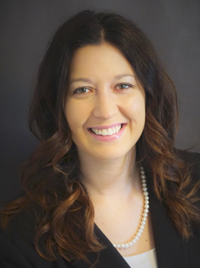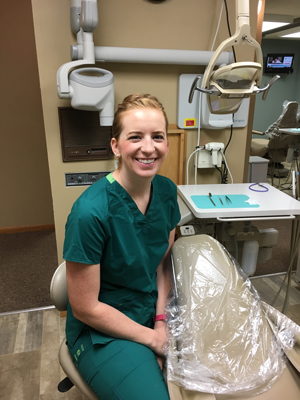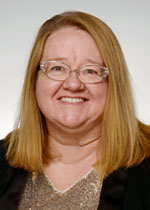Giving Back
Loan repayment programs help attract healthcare professionals to rural areas.
By Brenda Haugen on
It's no secret that there's a shortage of healthcare professionals in the United States, particularly in rural areas. It's also common knowledge that student loan debt can be daunting for graduates who trained for healthcare careers, especially for those with advanced degrees. But there is a solution that can help ease both problems—loan repayment assistance.
A variety of state-based loan repayment programs are available for healthcare professionals willing to work in rural and underserved areas. Nearly 60 healthcare professionals working in North Dakota right now are receiving loan repayment assistance from such programs as the Healthcare Professional Student Loan Repayment Program (HCPS), the North Dakota Federal State Loan Repayment Program (SLRP), and the Dentist Loan Repayment Program (DLRP).
The SLRP is an amazing program for the state to offer.
"The SLRP is an amazing program for the state to offer," said Tara Brandner, FNP-C, a family nurse practitioner at the Ashley Medical Center in Ashley, North Dakota — her hometown. "It truly is one of the main attractions rural facilities have to attract quality applicants."

Brandner earned a bachelor's degree in nursing from the University of Mary in Bismarck. She went on to earn a family nurse practitioner master's degree and a doctorate in nursing practice both from George Washington University in Washington, D.C.
"I felt inclined to serve a healthcare area in need," Brandner said.
Brandner was accepted into the SLRP three years ago. The goal of repayment programs such as the SLRP is to help place healthcare professionals in public and nonprofit sites in areas where the need is greatest. Those eligible for SLRP assistance include physicians, registered nurses, registered pharmacists, dentists, nurse practitioners, physician assistants, psychiatric nurse specialists, certified nurse midwives, and those with expertise in mental and behavioral health, such as social workers, psychologists, licensed professional counselors, and addiction counselors.
"The loan repayment program means more financial freedom for my family," Brandner said. "I dedicated nine years of my life to continuing education and along with that comes a good amount of student loans. I had obtained three degrees, and loan repayment was very attractive. I started to research what options were available to help our family with the loans I had accumulated. I contacted the Center for Rural Health, and they directed me to the SLRP program."
Administered by the North Dakota Department of Health, the SLRP program offers up to $50,000 per year in loan repayment assistance for a two-year commitment. The HCPS program offers physicians, for example, as much as $20,000 per year for up to five years.
"Originally I was only accepted for the two-year program," Brandner continued. "The state's funding additional years for the [retention] portion of the program was a huge surprise and benefit. I am currently in my third year of the program and was recently accepted for my fourth."
Amy Holtan Ellingson earned a bachelor's degree in psychology from the University of North Dakota and a doctor of dental surgery degree from the University of Minnesota. A native of Grand Forks, she heard about the loan repayment program from a colleague.
The loan program is a great tool to attract dentists to work in rural locations.
"The doctor that I work with now received the loan repayment and talked about how helpful it was for him to lower his debt load," Holtan Ellingson said. "The loan program is a great tool to attract dentists to work in rural locations."

Holtan Ellingson (right) works at James River Dentistry in New Rockford, and also serves as a contract dentist at the Spirit Lake Health Center in Fort Totten. Both Holtan Ellingson and Brandner said working in a rural area comes with many benefits.
"Patients in a rural community are very gracious and thankful for the services provided to them. It is enjoyable to see them outside of the clinic and hear how well they are doing or how I may have helped them or their family," Brandner said. "Rural communities are very close, and I have found that rewarding to be part of."
She added that rural living is a benefit for her family as well. She and her husband, Chuck, who teaches in Wishek, are expecting their first child in January.
"Raising a family in a rural community was something that was important to us," Tara Brandner said. "We also were looking for a community where we would be welcomed and able to be active within the community. Living in a rural community allows for active participation on many levels, such as community events, organizations, clubs, and fundraisers. This does, of course, occur in larger communities, but the bond and camaraderie is different and more tight-knit [in rural communities]."
Holtan Ellingson said the loan repayment program made a big difference in her life as well.
The loan repayment program has been great and a huge help in offsetting my student loans.
"The loan repayment program has been great and a huge help in offsetting my student loans," she said. "It's a great program. I would highly recommend it. For me, having ties to a rural location made it easy to make the choice to accept the loan repayment program and work here. For those who are unfamiliar with rural North Dakota, it could be a challenge, but I think they may find that they really like working in a small community. People in the community are so happy to have a young dentist come and contribute, as well as provide a valuable service."
Even though she's done with the program, Holtan Ellingson still plans to continue working in New Rockford.
Brandner is happy with her choice too.
Working in rural healthcare is one of the most rewarding careers I have ever held.
"Working in rural healthcare is one of the most rewarding careers I have ever held," she said. "Getting to know your patients in this setting is like no other job. You are not just building trust and a relationship with your patients but instead your entire community."
This article originally appeared in the Holiday 2017 issue of North Dakota Medicine.


 was a communications specialist at the Center for Rural Health at the University of North Dakota School of Medicine & Health Sciences in Grand Forks.
was a communications specialist at the Center for Rural Health at the University of North Dakota School of Medicine & Health Sciences in Grand Forks.



